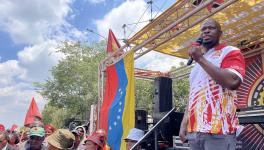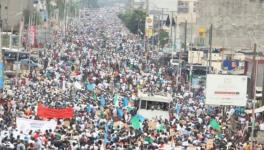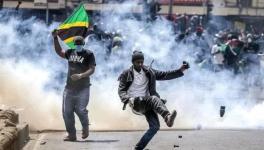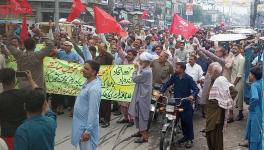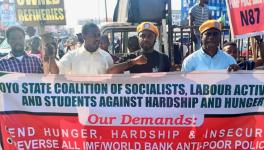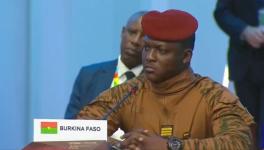Nigeria: Oil Workers Resist Monopolisation by Africa’s Richest Man
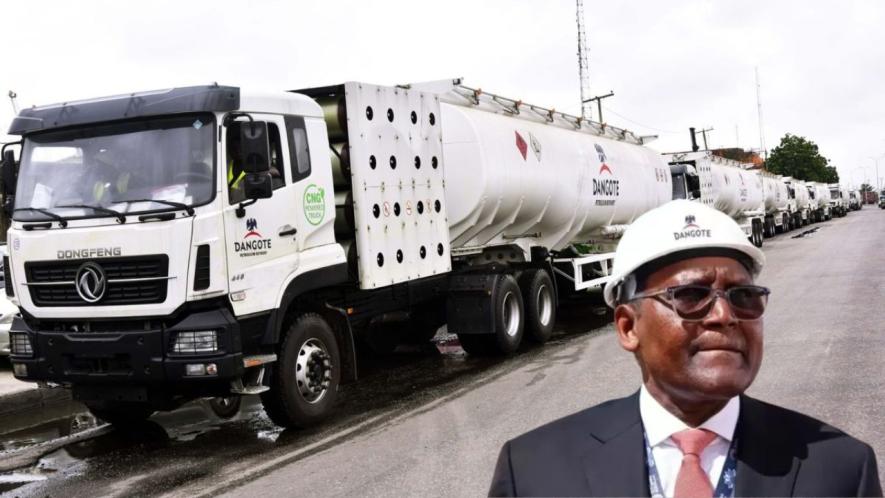
Aliko Dangote and oil tanker trucks, Nigeria. Photo: Dangote
Africa’s richest man, Aliko Dangote, is locked in a conflict with the unionized workers and drivers of his Nigeria-based oil refinery. After violating an agreement with the Nigeria Union of Petroleum and Natural Gas Workers (NUPENG), signed earlier this month to end its strike, Dangote Refinery secured a court order on September 18, restraining the union from returning to strike for 7 days.
Operational since January 2024, the Dangote refinery is the largest on the continent, built at a cost of USD 20 billion on the outskirts of Nigeria’s commercial capital, Lagos, by the Dangote Group.
After dominating sub-Saharan Africa’s cement production and cornering large portions of its market in sugar, salt, and packaging industries, the Nigerian multinational conglomerate is moving fast to take over the oil sector.
“This is not philanthropy, it is economic sabotage”
“The entire oil and gas Stakeholders were astounded and shocked” when Dangote announced in mid-June the import of 4,000 CNG tanker-trucks (subsequently raised to 10,000) to distribute gas to pumping stations and industrial units without any transportation charge.
“This is not philanthropy, it is economic sabotage,” NUPENG added in a statement. The union warns that the free distribution is “not a gift” but a “trap” to drive out competitors, and “monopolize distribution”, which, in the long run, will allow Dangote to charge extortionate prices from consumers.
The Nigerian Association of Road Transport Owners (NARTO) has also sounded the alarm. Distributing fuel to stations free of transport charge is “not only unsustainable but is also a deliberate attempt to undermine and eliminate the thousands of independent transporters who form the backbone of Nigeria’s petroleum distribution network.”
Together, its members own over 30,000 trucks that supply gas to stations country-wide. They employ “thousands of drivers, assistants, and service providers” – many represented by NUPENG.
Before raising these concerns publicly, the leaders of NUPENG and NARTO had sought an audience with Aliko Dangote to seek clarifications on his plan.
He directed them to his cousin, Sayyu Dantata, the Managing Director (MD) of Dangote Group. Dantata told them that the Dangote “had resolved to have monopolistic control, not only of crude oil refining, but also distribution,” NUPENG maintains.
He went on to inform them that the drivers to be hired for imported trucks would not be allowed to join any existing union. Later on August 29, his company, MRS Oil Nigeria Plc, started hiring drivers for Dangote. Recruits were “forced to sign an undertaking not to belong to any existing union in the Oil and Gas Industry,” added NUPENG’s statement.
In defense of unionization rights, the NUPENG declared that it would go on a nationwide strike from September 8. “The revelations contained in NUPENG’s statement represent not just an attack on petroleum workers, but a full-blown declaration of war against the Nigerian working class, trade unionism, and the principle of Decent Work,” said the Nigeria Labour Congress (NLC), a national umbrella of trade unions with which NUPENG is affiliated.
“It must be realized that this is not the first complaint we are receiving against the Dangote Group. We have received several from other unions” in various sectors in which the Dangote group operates. “All of them verge on the same acts of impunity and unfair labor practices.”
It went on to explain, with an element of regret, that in the past, it had defended the multi-national “from complaints by workers of other African nations out of patriotic fervor.” NUPENG itself had welcomed its refinery.
“We did so in good faith, in expectation [that] it would create jobs, strengthen local capacity, and benefit the Nigerian people, under a conducive atmosphere for unions to thrive,” it clarified.
“But we have reached the point where remedial actions have become necessary,” the NLC added.”Instead of lowering costs for Nigerians, the Dangote monopoly exploits scarcity and control of distribution to raise prices, thereby deepening poverty and hardship.”
“This is not industrialization; it is economic sabotage. It is not nation-building; it is class robbery,” added its statement in support of NUPENG, calling on “the Nigerian people to see through the deception: this is not philanthropy” but “plunder … not development” but “dispossession”.
Continental solidarity
It went on to declare, “We will not hesitate to mobilize all workers across the length and breadth of this country for actions and solidarity necessary to protect our dignity and to defend Nigeria from the clutches of monopoly capital.”
In its statement in solidarity with NLC, “our sister labor center”, the Trade Union Congress of Nigeria (TUC) said that “the labor movement will not fold its arms while Dangote and its companies treat Nigerian workers as slaves in their own country.”
The African Regional Organization of the International Trade Union Confederation (ITUC-Africa) added, “We are on red alert for continental mobilization against this persistent anti-union posture.”
The IndustriAll Global Union, which operates in 130 countries with 550 affiliates, including NUPENG, also declared “full solidarity”.
Support also came from employers in the downstream distribution. NARTO, representing owners of the trucks driven by NUPENG members, added that they would join in the strike action. So did the Petroleum Products Retail Outlets Owners Association of Nigeria (PETROAN), representing owners of fuel stations largely attended by NUPENG members.
Amid this build-up of cross-class, cross-sectoral momentum toward a strike, the name Direct Trucking Company Drivers Association (DTCDA) cropped up in the media on September 6. Claiming to speak on behalf of drivers, its spokespersons urged them to disregard the strike call by NUPENG’s Petroleum Tanker Drivers (PTD) Branch.
DTDCA’s president, Enoch Kanawa, “is a lawyer, not a tanker driver,” NUPENG pointed out. A former executive secretary of NARTO, Kanawa had moved on in 2012 to serve Dantata’s MRS as a legal advisor, before returning to contest for NARTO’s presidency with his backing, but losing to NARTO’s current president.
Six years later, he is back again – this time to undermine the union with an association fronted by Dantata’s company, and allegedly housed in the official headquarters of MRS. However, DTDCA appears to have had little impact. The strike was “one hundred percent successful,” the union maintains.
The following day, the company came to the negotiating table for a reconciliation meeting at the Federal Ministry of Labor and Employment.
Representing Dangote as its MD, Dantata signed a Memorandum of Understanding (MoU) with the union’s president, Williams Akporeha, and the Director of Trade Union Services and Industrial Relations, Amos Falonipe.
Its text states that Dangote’s “management agreed” in the meeting that it had refused “to allow their employees to be unionized by registered labor unions”. The MoU adds that “after exhaustive deliberations”, Dangote Group committed to allow the unionization rights of its employees, and “that the process of unionization shall commence immediately [on September 9] and be completed within two weeks,” ending September 22.
The Understanding, however, fell apart a day after signing when Dantata allegedly forced drivers who had long been members of NUPENG’s PTD branch to peel off the union stickers from their vehicles.
Subsequently, on September 11, when Dantata “instructed them to forcefully drive into Dangote Refinery to load”, NUPENG said that its “union officials stopped them from entering the Refinery to load because their trucks violated Union loading rules and regulations.”
As the union leaders held ground, Dantata allegedly “flew over them several times with his helicopter and then called the Navy of the Federal Republic” to intervene against this labor action on Africa’s west coast.
“We call on the Federal Government not to allow the Navy and other security agents being paid by the resources of this country to be used with impunity against the laws and people of this country,” the union added.
NUPENG placed all its “members on red alert for the resumption of the suspended nationwide industrial action” against Dangote. Facing another crippling work stoppage, the company approached the National Industrial Court in Abuja, securing an interim injunction on September 18, restraining NUPENG from resuming the strike.
In the meantime, Dangote has started its free-of-transport-cost fuel distribution last week, unleashing 1,000 CNG trucks for the purpose, with assurance that the remaining will also be set into motion this week.
NARTO is complaining that its “agreements with so many companies” are “at stake because a big brother is coming to supply directly to them,” laying the ground to what NUPENG warns will be a monopoly, which, in the long run, will result in higher costs to the consumers.
Courtesy: Peoples Dispatch
Get the latest reports & analysis with people's perspective on Protests, movements & deep analytical videos, discussions of the current affairs in your Telegram app. Subscribe to NewsClick's Telegram channel & get Real-Time updates on stories, as they get published on our website.










